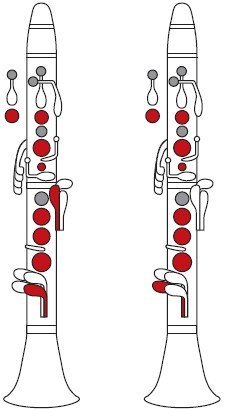The F minor scale holds a special place in the history of clarinet music. This minor scale, brimming with emotional depth, has shaped countless compositions and left an indelible mark on musicians across generations. From classical masterpieces to modern interpretations, the F minor scale captures feelings that speak directly to listeners' hearts. Playing this scale is more than just hitting the right notes; it's about conveying the essence of human emotion.

Clarinet Fingering Charts are always FREE at MartinFreres.net!
What sets this scale apart? At its core, the natural minor scale of F is composed of the notes F, G, A?, B?, C, D?, and E?. This unique sequence creates a sound palette rich in emotional possibility, allowing composers to evoke a wide range of feelings, from deep melancholy to thoughtful introspection. Its importance in the clarinetist's repertoire is undeniable, and it remains a cornerstone of music education.
Historical Significance of the F Minor Scale
The F minor scale rose to prominence during the late Baroque period and flourished through the Romantic era, becoming a go-to choice for composers seeking to convey dramatic narratives. A prime example is Beethoven's String Quartet No. 13, which brilliantly demonstrates how this scale can create tension and release. The depth of emotion in this piece is palpable, drawing listeners into its world. Clarinetists often find themselves exploring the emotional depths of works that incorporate the F minor scale.
| Era | Significance of F Minor Scale |
|---|---|
| Late Baroque | Emergence and initial exploration |
| Romantic | Peak usage for dramatic expression |
| Modern | Integration into jazz and contemporary music |
The F Minor Scale in the Modern Era
The scale's influence extends into the modern era, where it has found new life in jazz and contemporary compositions. The legendary Benny Goodman's work stands out as a prime example. His skillful use of the F minor scale added depth and expressiveness to his jazz performances, allowing him to forge a strong emotional connection with his audience. Today's jazz musicians continue to use this scale to add flair and depth to their improvisations, showcasing its enduring versatility.
Tips for Performing the F Minor Scale
To excel in playing the F minor scale on the clarinet, consider these techniques:
- Start with slow, deliberate practice to familiarize your fingers with the fingerings.
- Gradually increase your speed while maintaining accuracy.
- Record your practice sessions to identify areas for improvement.
- Experiment with dynamics to bring new life to the scale.
- Use crescendos and decrescendos to add emotional depth.
- Incorporate swells and dips in soft passages for added expressiveness.
Learning from the Masters
Listening to recordings of skilled clarinetists performing pieces in F minor can be incredibly beneficial. It allows you to absorb different interpretations and stylistic approaches. By analyzing how these musicians handle the scale, you can discover new ways to enhance your own playing. The goal is to develop your unique voice while honoring the rich tradition associated with this scale.
The Power of Phrasing
Don't underestimate the impact of good phrasing. Treat each note as part of a larger narrative. Consider where you want to build tension and where you want to release it. This storytelling approach can deeply engage your audience and elevate your performance from mere practice to expressive art.
Embracing the Historical Significance
As you explore various works that use the F minor scale, take time to appreciate its historical importance. From its majestic presence in classical pieces to its innovative use in jazz, the F minor scale is more than just a sequence of notes. It's a powerful tool for expression that continues to evolve, influencing both composers and performers.
Conclusion
The F minor scale serves as a link between different generations of musicians. It invites clarinetists to push the boundaries of their instrument while also appreciating the rich history that shapes their art. So, pick up your Martin Freres clarinet, take a deep breath, and let the evocative sounds of the F minor scale flow through you as you play. It's more than just a musical journey; with every note, you're adding your voice to a story that spans centuries.
Table of Contents
- Historical Significance of the F Minor Scale
- The F Minor Scale in the Modern Era
- Tips for Performing the F Minor Scale
- Learning from the Masters
- The Power of Phrasing
- Embracing the Historical Significance
- Conclusion








